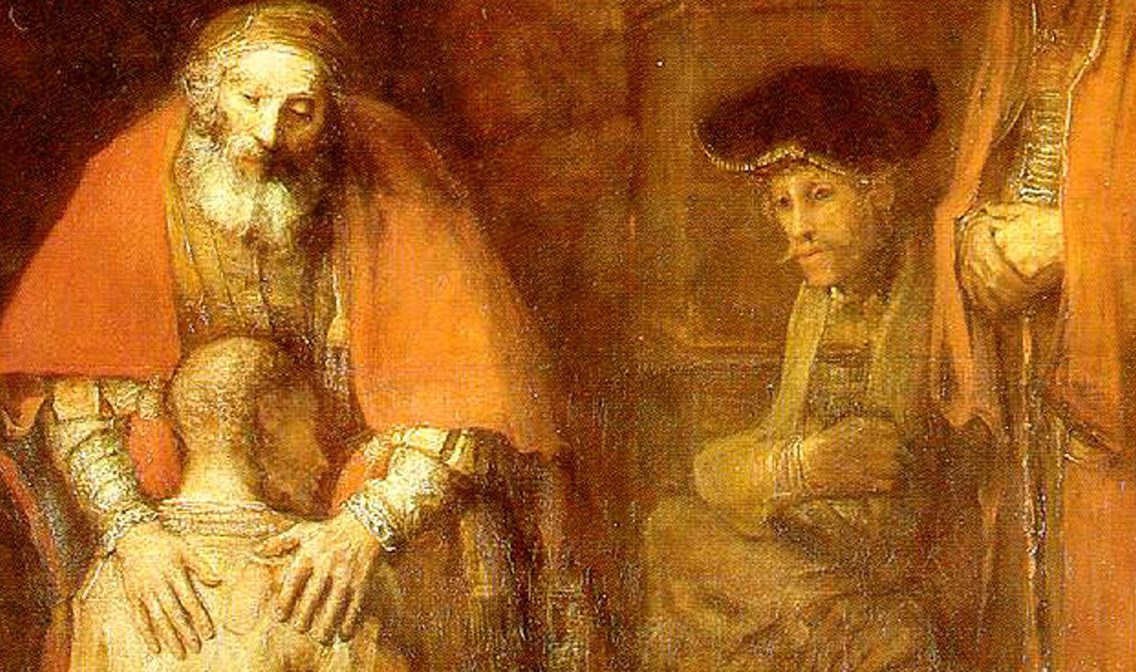Pope on the prodigal son: God always leaves the door open
In today's catechesis, released in written form, Francis began a new series of reflections on parables: "They provoke us." Speaking about the story of the father and his two sons, the pope notes that even if “we are lost, God comes looking for us!” His love welcomes, like the embrace depicted by Rembrandt. This morning Francis met with the staff of the Gemelli Hospital. His health is improving.
Vatican City (AsiaNews) – The cycle of Jubilee catechesis prepared for the Wednesday general audiences continues. As in previous for several weeks, only the text was released due to Pope Francis' ongoing convalescence after treatment at Rome’s Gemelli Hospital.
After discussing some of the most significant figures Jesus met in the Gospel (such as Nicodemus and Zacchaeus), the pope’s reflections today turned to parables, which “also touch our lives,” and “provoke us. And they ask us to take a position: where am I in this story?”
Francis appeared in St Peter's Square the last two Sundays, last time without oxygen support, a sign that his health is improving.
“The Pope continues to improve from the motor, respiratory and voice points of view," the Holy See Press Office announced yesterday. “He can go without oxygen for longer periods of time. Compared to high flows, a residual use continues for therapeutic purposes, always in the evening hours.”
This morning the pontiff met with 70 people working at the hospital, the Catholic University and the Health and Hygiene Directorate of Vatican City, at the Paul VI Hall, the community that welcomed him during his treatment for 38 days.
The first catechesis on the parables is dedicated to “the most famous parable, the one that we perhaps all remember from when we were children: the parable of the father and the two sons (Lk 15:1-3, 11-32),” Francis said.
“In this we find the heart of the Gospel of Jesus, namely God’s mercy.” Jesus, evangelist Luke says, “tells this parable for the pharisees and the scribes, who lamented that He ate with sinners. This is why it could be said that it is a parable addressed to those who are lost, but do not know it, and judge others.”
The story tells of a father who has two sons. The youngest asks for the inheritance, leaves and squanders it. Reduced to poverty, he returns and his father welcomes him with joy, while his older brother is indignant.
“The Gospel is intended to give us a message of hope, because it tells us that wherever we are lost, and however we are lost, God always comes looking for us!” he added.
This story shows that love "is always a commitment, there is always something that we must lose in order to go towards the other.”
The youngest son feels "hungers for affection, [. . .] But love is a precious gift; it must be treated with care. Instead, he squanders it”. Like him we may to it with “the first master we chance upon,” the pontiff explained.
Believing that one can be in a relationship only “as servants" is a "false vision of love", from which it is possible to free oneself. “In the relationship with God, we have precisely this experience,” the pope said.
Francis went on to speak about the depiction of the episode by Dutch painter Rembrandt (pictured), who “beautifully depicted the return of the prodigal son.”
The “young man’s head is shaven, like that of a penitent, but it also looks like the head of a child, because this son is being born again. And then the father’s hands: one male and the other female, to describe the strength and tenderness in the embrace of forgiveness.”
The eldest son represents those for whom the parable is told. “Paradoxically, it is precisely the eldest son who in the end risks being left out, because he does not share his father’s joy.”
Even if the one who has always stayed at home with his father, even if “distant from him, distant in heart. [. . .] The father goes towards him too. He does not reproach him or call him to duty. He wants only that he feels his love. He invites him to enter and to leave the door open.”
“Indeed, this is the reason for hope: we are able to hope because we know that the Father is waiting for us, He sees us from afar, and He always leaves the door open.”
27/03/2022 15:00
27/10/2016 13:44
04/08/2016 18:36







.png)










